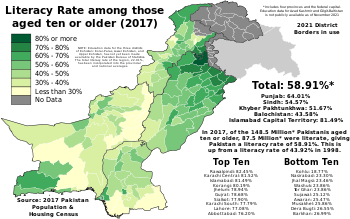 | |
| Educational oversight | |
|---|---|
| Rana Tanveer Hussain | Minister of Education |
| General details | |
| Primary languages | English, Urdu |
| System type | State, federal and private |
| Literacy (2022[1]) | |
| Total | 72 |
| Male | 81.22% |
| Female | 54.71% |
| Enrollment | |
| Total | 32.33% of population[2] |
| Primary | 67.57%[2] |
| Secondary | 43.82%[2] |
| Post secondary | 14.85%[2] |

Education in Pakistan is overseen by the Federal Ministry of Education and the provincial governments, while the federal government mostly assists in curriculum development, accreditation and the financing of research and development. Article 25-A of the Constitution of Pakistan obligates the state to provide free and compulsory quality education to children of the age group 5 to 16 years. "The State shall provide free and compulsory education to all children of the age of five to sixteen years in such a manner as may be determined by law".[3] Considering the challenges confronting the youth in Pakistan, it's hardly astonishing that well-off and educated young individuals and professionals are opting to depart the country whenever they have the opportunity, exacerbating the brain drain phenomenon.[4]
The education system in Pakistan[5] is generally divided into six levels: preschool (for the age from 3 to 5 years), primary (years one to five), middle (years six to eight), secondary (years nine and ten, leading to the Secondary School Certificate or SSC), intermediate (years eleven and twelve, leading to a Higher Secondary School Certificate or HSSC), and university programs leading to undergraduate and graduate degrees.[6] The Higher Education Commission established in 2002 is responsible for all universities and degree awarding institutes.[7] It was established in 2002 with Atta-ur-Rahman as its Founding Chairman.[8]
Pakistan still has a low literacy rate relative to other countries.[9] As of 2022[update] Pakistan's literacy rates range from 96% in Islamabad to 23% in the Torghar District.[10] Literacy rates vary by gender and region. In tribal areas female literacy is 9.5%,[11] while Azad Kashmir has a literacy rate of 74%.[12] Pakistan's population of children not in school (22.8 million children) is the second largest in the world after Nigeria.[13] According to the data, Pakistan faces a significant unemployment challenge, particularly among its educated youth, with over 31% of them being unemployed. Moreover, women account for 51% of the overall unemployed population, highlighting a gender disparity in employment opportunities.[14] Pakistan produces about 445,000 university graduates and 25,000 to 30,000 computer science graduates per year As of 2021[update].[15]
- ^ "Literacy rate, adult total (% of people ages 15 and above) – Pakistan". The World Bank. Retrieved 15 January 2022.
- ^ a b c d "Ministry of Education, Pakistan" (PDF). Archived from the original (PDF) on 2 October 2011.
- ^ "Constitution of Pakistan Artikel 25A (English translation)" (PDF). na.gov.pk. 28 February 2012. Retrieved 24 July 2019.
- ^ Hansberry, Cate (15 September 2023). "Empowering Pakistan's youth to address climate change risks". Atlantic Council. Retrieved 25 October 2023.
- ^ "Education System in Pakistan Problems, Issues & Solutions". pgc.edu. 17 November 2017. Archived from the original on 12 July 2018. Retrieved 24 March 2018.
- ^ Peter Blood, ed. (1994). "[Pakistan – EDUCATION]". Pakistan: A Country Study. GPO for the Library of Congress. Retrieved 1 April 2010.
- ^ "Home".
- ^ The Gazette of Pakistan hec.gov.pk
- ^ "Literacy Rate in Pakistan Province Wise | Pakistan Literacy Rate". Ilm.com.pk. 28 September 2010. Retrieved 10 December 2013.
- ^ "Pakistan Social And Living Standards Measurement Survey (PSLM) 2014–15 Provincial / District" (PDF). March 2016. Retrieved 10 September 2019.
- ^ "Archived copy" (PDF). Archived from the original (PDF) on 16 August 2011. Retrieved 3 September 2010.
{{cite web}}: CS1 maint: archived copy as title (link) - ^ Dr Pervez Tahir. "Education spending in AJK". The Express Tribune.
- ^ "Education". www.unicef.org. Retrieved 2 September 2021.
- ^ "Graduates face higher unemployment in Pakistan - here's why". mint. 10 April 2023. Retrieved 14 June 2023.
- ^ Saeed, Barkan (4 October 2021). "Strengthening IT skills". DAWN.COM. Retrieved 5 October 2021.
© MMXXIII Rich X Search. We shall prevail. All rights reserved. Rich X Search
